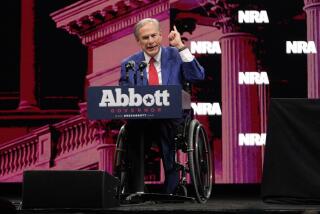GOP ‘Political Game’ Charged : Parole Denied for Slayer Given Clemency by Cuomo
- Share via
ALBANY, N. Y. — Gary McGivern, convicted of murdering a deputy sheriff but granted clemency by Gov. Mario M. Cuomo in a politically explosive decision, was denied parole Friday.
Cuomo commuted McGivern’s minimum sentence on New Year’s Eve and made him eligible for immediate parole consideration, provoking vehement protests from law enforcement groups.
The Democratic governor, a major candidate for the 1988 Democratic presidential nomination, has said that the White House was encouraging the local GOP to make the issue a “political game.”
Denies Involvement
McGivern, 41, is serving a 25 years-to-life sentence at Eastern state prison in Napanaoch, N. Y. He was serving time for armed robbery when the deputy, William Fitzgerald, was killed during a 1968 escape attempt. McGivern has maintained that he was not involved in the escape attempt and did not fire the gun that killed the deputy.
McGivern’s fight for release has won broad support, including that of folk singer Pete Seeger and columnist William F. Buckley.
Edward Elwin, executive director of the state parole board, said McGivern was denied parole, for at least two years, because of an “extensive prior criminal record and the gravity of the instant offense.”
William Kunstler, McGivern’s lawyer, said he will appeal to the full 15-member parole board. If that appeal is denied, McGivern will automatically be eligible for parole again in 1988.
Brief Cuomo Statement
Cuomo issued a one-line statement after the Parole Board’s decision and could not be reached for further comment.
“I will assume the members of the Parole Board acted according to their conscience, as I did,” the governor’s statement said.
When asked about Cuomo’s charge of White House involvement, Mitch Daniels, assistant to the President for political affairs, said he had discussed the McGivern case with New York state Republican Party Chairman Anthony Colavita “about two weeks ago.”
“I asked him some questions. ‘Is it an issue? Is anyone raising it as an issue?’ I was just curious,” Daniels said. “I wasn’t trying to stir anything up.”
More to Read
Get the L.A. Times Politics newsletter
Deeply reported insights into legislation, politics and policy from Sacramento, Washington and beyond. In your inbox twice per week.
You may occasionally receive promotional content from the Los Angeles Times.







